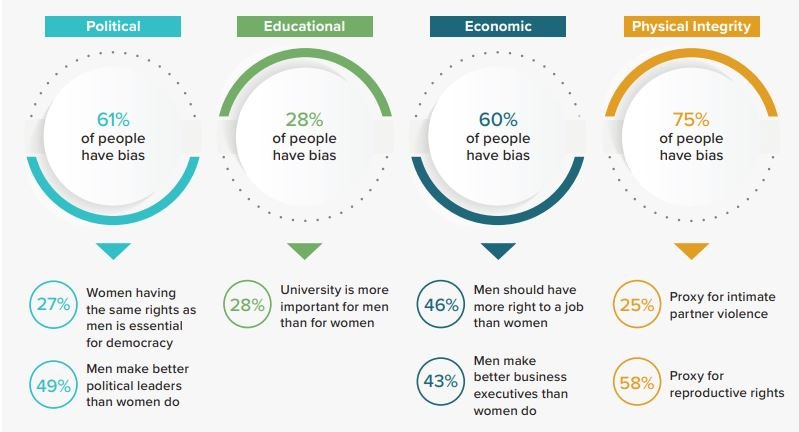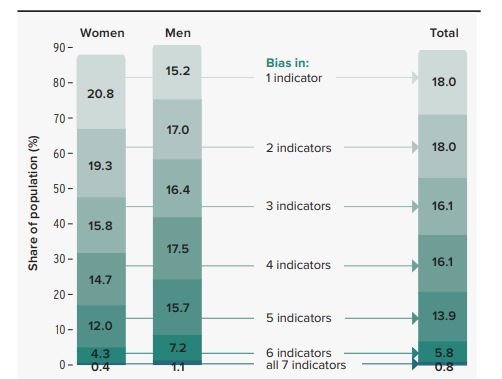The Gender Social Norms Index reveals, 9 out of 10 men and women are biased against women. Nearly half the world’s people believe that men are better political leaders than women. 40% believe men are better business executives. A quarter believes it is justified for men to beat their wives.
90% biased against women
Almost 90 percent of people have at least one bias against women. Biases are prevalent among both men and women. Bias against women is as entrenched as it was a decade ago and gender equality progress has gone into reverse, according to a UN report. Gender biases are pronounced in both low and high Human Development Index (HDI) countries. Biased gender.

Half the world’s people think that men make better political leaders than women, and 43 percent think that men make better business executives than women do. Only
11 percent of heads of state and 9 percent of heads of government are women,13 and women hold only 22 percent of ministerial posts. The majority of these ministerial roles are in the ministries of women, children, youth, the elderly, the disabled, or social and environmental sectors.14 In the paid economy women hold only 28 percent of managerial positions.

Social norms hold women back from becoming leaders. Even though many formal barriers to women holding political office have been removed in most countries, gender gaps in political representation remain high. On average, the share of heads of state or government who are women has remained around 10 percent worldwide since 1995. Women hold just over a quarter of parliament seats globally.
women are underrepresented
The world is not on track to achieve gender equality by 2030. The global Gender Inequality Index (GII) value, UNDP’s composite measure of gender inequality in empowerment, has remained stagnant since 2019. From corporate boardrooms to presidential cabinets, women remain underrepresented in leadership positions.

Using data from 80 countries and territories covering 85 percent of the global population, the 2023 GSNI paints a portrait of dominant and widespread gender-based biases across countries and time. This report pays special attention to biases against women’s economic empowerment and political participation, argues that gender social norms can and do change, and suggests how we can advance this change.
Justifiable for a man to beat his wife?
Today, more than a quarter of the world’s people believe that it is justifiable for a man to beat his wife. A similar share (26 percent) of women over age 15 have experienced intimate partner violence. People who believe that violence is acceptable might directly enforce it or justify it. Social norms permissive to violence also make it difficult for women to denounce and escape violence.

Social norms shift when women become leaders
There is overwhelming evidence that the presence of women leaders can reduce biases against women leaders through visibility and representation. But women leaders are often observed through a gender lens and are not judged solely for their performance. Having female leaders at the highest levels of government often leads to more pronounced changes in
gender social norms in both directions.
More firms are hiring women in senior executive positions, particularly in some very high HDI countries. The share of CEOs in US Fortune 500 companies who are women reached an all-time high of 10 percent in 2023. In Stoxx Europe 600 companies women account for 16 percent of CEOs and 33 percent of nonexecutive directors.
Women in leadership positions have a catalytic effect, driving more women to have higher professional and educational aspirations.








